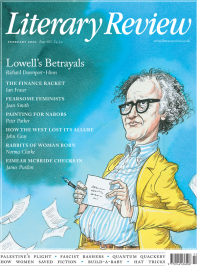Simon Baker
Summer of ’59
Here We Are
By Graham Swift
Scribner 208pp £14.99
English novelists have always found some eras to be more equal than others. The last years of the 1950s, like 1912 or 1913, are often used as settings because they represent a final act: they are rich in potential for dramatic irony, with the characters being unaware of something to which we are privy, namely that everything is about to change.
Graham Swift’s new novel looks back to 1959, when the end of pier show continues to hold the guffawing crowd in its innocently bawdy grasp, just as the Victorian music hall had once done. As we read, we know that in a short time the Rolling Stones, Bob Dylan and colour television will sweep that age over the balustrade and into the sea, but for now everyone is happy.
Ronnie, Evie and Jack, three twenty-something variety performers, are beginning to ascend the lower rungs of the showbiz ladder at a popular theatre in Brighton. Ronnie is a talented magician with a taste for sophisticated illusions. Jack, his friend and the show’s compere, is handsome and affable but also shrewd, and aware that their way of life is fading. Evie joins Ronnie as the classic magician’s foil, the glamorous assistant, and in a short time becomes his fiancée. The fortunes of all three seem set to improve, but something happens that summer that changes things permanently.
Here We Are shifts between perspectives, but mostly we are with Evie in 2009, looking back half a century to the days when the show began to blossom, just as she, newly adorned with an engagement ring from Ronnie, became entangled with Jack. Several aspects typical of Swift’s fiction – life-altering events (often later suppressed in memory), moments of change in English history, regrets, roads not taken – are common to the works of many writers, but for Swift they are often the entire edifice rather than simply part of the decor; that is certainly the case in this book.
Jack eventually married Evie and became a great success before suffering the inevitable late dip into obscurity. In the summer of 1959 each of the trio is hard-working and committed, and each is imbued with stoicism and independence born of a childhood spent in wartime. Ronnie left an unsettled life in east London as a boy for the haven of a middle-class family home in Oxford with the childless Lawrences, who adored him. Eric Lawrence was an amateur magician who taught Ronnie the (literal) tricks of the trade. Ronnie’s subsequent early career seems, in part, to call back to a precious time in his childhood, and his instant fondness for Evie stems from a desire for the stability that eluded him in his first few years with a fiery mother and nomadic father.
Ronnie is an interesting figure, and in fact all three characters feel completely plausible: Jack refers to himself as ‘just an old song-and-dance man’ and yet in his later career, we are told, he went on to display an unexpected flair for serious acting. Evie, in one way merely someone to stand in a sequined costume looking lovely, turns out to be a clear-sighted businesswoman and indispensible to Jack’s eventual triumphs (she ‘found the all-important little key in the small of his back and learnt how, carefully, lovingly, to turn it, where all the others were too busy just wrapping their legs around him’). After a while, though, the reader may feel (as this one did) that it is all perhaps a bit too familiar and that a few clinching details would have enlivened what occasionally tends towards stock portrayal.
Another slight weakness is that too often we’re simply told things. Not enough of the novel is dramatised, and so not enough of the novel is dramatic. Instead the story unfolds mainly through summary, with Swift more often telling than showing what happened. Just as William Trevor used to do, Swift deliberately flirts with cliché (both writers have, with wry confidence, previously begun a story with ‘Once upon a time’), but a paragraph opener such as ‘Ronnie Deane was a different kettle of fish’ needs a pretty nuanced follow-on to avoid looking slack and Swift doesn’t provide one.
That said, Here We Are – and indeed Swift himself – is too good to fall flat. While lacking the sparse brilliance of Swift’s previous book, the 2016 novella Mothering Sunday, Here We Are is nevertheless a pleasurable, low-gear excursion into the recent, yet strangely ancient past.

Sign Up to our newsletter
Receive free articles, highlights from the archive, news, details of prizes, and much more.@Lit_Review
Follow Literary Review on Twitter
Twitter Feed
Henry James returned to America in 1904 with three objectives: to see his brother William, to deliver a series of lectures on Balzac, and to gather material for a pair of books about modern America.
Peter Rose follows James out west.
Peter Rose - The Restless Analyst
Peter Rose: The Restless Analyst - Henry James Comes Home: Rediscovering America in the Gilded Age by Peter Brooks...
literaryreview.co.uk
Vladimir Putin served his apprenticeship in the KGB toward the end of the Cold War, a period during which Western societies were infiltrated by so-called 'illegals'.
Piers Brendon examines how the culture of Soviet spycraft shaped his thinking.
Piers Brendon - Tinker, Tailor, Sleeper, Troll
Piers Brendon: Tinker, Tailor, Sleeper, Troll - The Illegals: Russia’s Most Audacious Spies and the Plot to Infiltrate the West by Shaun Walker
literaryreview.co.uk
Vladimir Putin served his political apprenticeship in the KGB toward the end of the Cold War, a period during which Western societies were infiltrated by so-called ‘illegals’.
Piers Brendon examines how the culture of Soviet spycraft shaped his thinking.
Richard Vinen - Dictator in the Dock
Richard Vinen: Dictator in the Dock - 38 Londres Street: On Impunity, Pinochet in England and a Nazi in Patagonia by Philippe Sands
literaryreview.co.uk